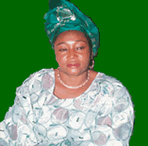Before 1993, very few outside the Abiola family had heard of Kudirat Abiola. That was hardly surprising, given the number of women in the late politician’s harem. Abiola’s decision to vie for presidency would draw out Kudirat from her routine of being a business woman and a wife. But it was the post-election period that actually revealed who Kudirat was: intrepid and clear-thinking.
Kudirat became an activist, following the annulment of the 1993 presidential election won by her husband and his subsequent detention on treason charges.
From the time of his arrest, Kudirat courageously called for her husband’s release despite constant and vindictive harassment of her family and supporters by the Abacha regime.
The regime had hoped that its policies of abduction, killing or imprisonment of political opponents, would stifle opposition to it. The regime, however, did not reckon with the determination and courage of Kudirat, whose life had been completely disrupted by its arbitrary use of powers.
Kudirat was transformed overnight to become a crusader for justice, one that was strident. She would not let the authorities get away with their crimes unchallenged.
Kudirat Abiola gave interviews on several occasions to the foreign and local press in which she insisted on the sanctity of her husband’s mandate. “It is no longer a matter of trading a mandate for freedom. The matter of June 12 is more than Abiola himself, but the survival of you and me, whether we want unity. If today, Abiola says he doesn’t want to be president, that does not kill June 12. We must fight it to its logical conclusion,” she said defiantly. She repeatedly called for her husband’s release and accused the government of destroying her family financially.
Abacha felt hot under the collar, and soon, Kudirat was charged with conspiracy and making false statements. But a Lagos High Court acquitted her of the charges of conspiracy and making false statements.
Again on 28 May 1996, she was charged with the offences and the Lagos High Court ordered her release on bail to await trial on 17 July. Despite this harassment, Kudirat Abiola continued her outspoken campaign on behalf of her husband.
Her proposed trial never held, as assailants shot her and her driver at point-blank range, in Lagos, on 4 June 1996. Kudirat died later in the hospital. The driver was wounded. Abacha, expressed his condolences to the family, describing the killing as the work of armed bandits. He later arrested senior members of the National Democratic Coalition, NADECO, who had collaborated with her in the struggle, and accused them of her murder.
Alhaji Ganiyu Dawodu, Chief Ayo Adebanjo and Senator Abraham Adesanya were those arrested. But the feeling on the street was that Kudirat was killed by the government.
On 14 October 1996 the three NADECO officials were released. The government failed to initiate a thorough and impartial investigation into the assassination. The police inquiry set up was criticised for not meeting international standards for the investigation of possible extrajudicial executions.
Subsequent confessions by Sgt. Rogers, the famous hitman of the Abacha regime, have reinforced the belief that Kudirat was killed. Rogers is a prosecution witness in a string of murder cases launched in 1999 to unravel some of the heinous acts of Abacha’s agents.
Source:
Please rate this
Poor




 Excellent
Excellent




 Excellent
Excellent
Votes: 0 |NaN out of 5








